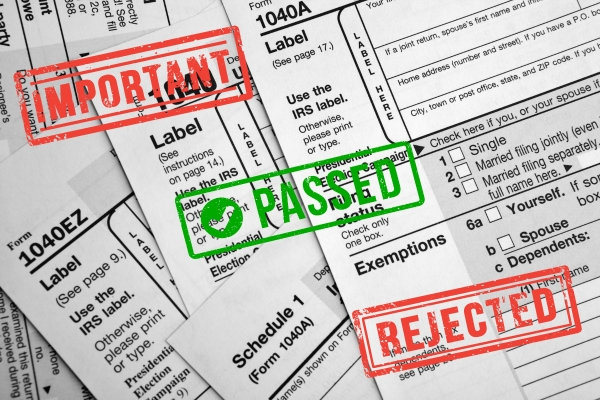Discontinued Tax Forms
US Resident, Commonwealth, and Nonresident

When it comes to filing your annual tax returns, understanding which forms are required can be challenging - especially when certain forms have been discontinued. Each year, the Internal Revenue Service (IRS) reviews and updates the tax forms available, sometimes eliminating outdated forms to streamline the process or adapt to changes in tax law.
Let's discuss which federal income tax forms have been discontinued and why, so you can better prepare your US individual tax returns.
Recently Discontinued IRS Tax Forms
Below is a list of some notable federal income tax forms that have been discontinued, along with the year they were last used and any changes that replaced their functionality.
This information is important for taxpayers filing as US residents, nonresidents, and commonwealth filers, as it helps ensure that they are using the correct forms when preparing their tax returns.
- Form 1040A Short Form
Discontinued after Tax Year 2018.
This simplified version of the standard Form 1040 was used by individuals with straightforward financial situations. It has since been merged into the redesigned Form 1040 to streamline the filing process. - Form 1040EZ Easy Form
Discontinued after Tax Year 2018.
Form 1040EZ was used by single or married taxpayers with no dependents and relatively simple tax situations. It was consolidated with Form 1040 to simplify the tax filing experience. - Form 1040PR
Discontinued after Tax Year 2019.
This form was specific to residents of Puerto Rico for reporting self-employment tax. Now, residents of Puerto Rico use Form 1040-SS instead. - Schedule 4
Discontinued after Tax Year 2018.
This schedule was used for calculating other taxes, including self-employment tax and additional Medicare tax. Its elements were integrated into the redesigned Form 1040 and Schedule 2. - Schedule 5
Discontinued after Tax Year 2018.
Schedule 5 reported other payments, such as estimated tax payments and amounts paid with extension requests. It was merged into Schedule 3 of the updated Form 1040. - Schedule 6
Discontinued after Tax Year 2018.
This schedule allowed taxpayers to designate a third-party designee to discuss their tax return with the IRS. This functionality is now integrated directly into Form 1040. - Schedule C-EZ
Discontinued after Tax Year 2018.
Schedule C-EZ was a simplified version of Schedule C for reporting business income. It was eliminated to simplify small business tax reporting under the updated rules, and all business income reporting now goes through Schedule C.
Why Are IRS Tax Forms Discontinued?
The IRS discontinues forms for several reasons, primarily to simplify tax filing and keep up with changes in tax regulations. When new tax credits are introduced by Congress, they may necessitate the creation of new income tax forms.
Here are some common reasons why a form may be discontinued:
- Tax Code Simplification: As tax laws evolve, some forms are consolidated into others to reduce redundancy and make the process more efficient.
- Changes in Eligibility: The IRS may discontinue forms as tax credits or deductions change, making the forms no longer applicable.
- Digital Transition: The IRS is increasingly encouraging electronic filing, and some paper forms are eliminated to streamline the digital filing processes.
- Reduced Complexity: Simplified forms, such as Form 1040, have replaced multiple specialized forms, making it easier for taxpayers to navigate their annual income tax return.
The tax code changes frequently, and understanding which forms are discontinued is important when preparing your income tax return. Usually the latest form instructions are enough to point you in the right direction. However, if you're unsure which forms apply to your situation, consider asking a local or remote tax professional for help.
Last updated: November 10, 2024
References:
- Here are five facts about the new Form 1040. U.S. Department of the Treasury, Internal Revenue Service. Retrieved November 10, 2024.
- About Form 1040-A, US Individual Income Tax Return. U.S. Department of the Treasury, Internal Revenue Service. Retrieved November 10, 2024.
- About Form 1040-EZ, Income Tax Return for Single and Joint Filers With No Dependents. U.S. Department of the Treasury, Internal Revenue Service. Retrieved November 10, 2024.
- About Form 1040-PR, Self-Employment Tax Return - Puerto Rico. U.S. Department of the Treasury, Internal Revenue Service. Retrieved November 10, 2024.
- About Schedule C-EZ, Net Profit from Business. U.S. Department of the Treasury, Internal Revenue Service. Retrieved November 10, 2024.
- What is the IRS 1040A Form?. Intuit TurboTax, Income Tax Preparation Service. Retrieved November 10, 2024.
- Individual forms. WIKIPEDIA, IRS Tax Forms. Retrieved November 10, 2024.
